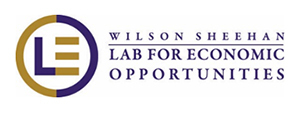
A White House Council of Economic Advisers report released Tuesday (July 14) includes an account of Reading for Life (RFL), a local juvenile diversion program that is being evaluated by the University of Notre Dame’s Wilson Sheehan Lab for Economic Opportunities (LEO).
The report, “Economic Costs of Youth Disadvantage and High-Return Opportunities for Change,” features the RFL program, which has been used at the St. Joseph County Juvenile Justice Center since 2007. RFL engages juvenile offenders in structured discussions of works of fiction that examine virtue. It makes use of virtue theory, works of literature, group discussion, small mentoring groups and journaling to stimulate moral development in juvenile offenders. Based on LEO’s analysis, RFL has resulted in large and statistically significant drops in future arrests. It has been particularly successful at reducing the likelihood of future serious offenses and reducing recidivism in groups with the highest propensity for future offenses.
“We are very honored to be included in this report, and are grateful to the tremendous volunteer mentors, Reading for Life staff and financial sponsors who have made our research over the past 10 years both meaningful and accessible,” said RFL founder and board president Alesha Seroczynski.
“Our data support what we already intuitively know,” said Seroczynski, who also is faculty affiliate with Notre Dame’s William J. Shaw Center for Children and Families. “RFL graduates return to our communities better citizens, making more virtuous life choices and contributing to the polis in ways that would make even Aristotle proud. Young people deserve the very best we can give them, and I sincerely hope that more youth embroiled in the juvenile justice system have the opportunity to experience RFL the way the adolescents in our study have.”
The Wilson Sheehan Lab for Economic Opportunities is a research center in Notre Dame’s economics department. It aims to identify innovative, effective and scalable programs that help people move out of poverty. LEO’s research is conducted by faculty from the University of Notre Dame as well as scholars from across the country with expertise in designing and evaluating the impact of domestic anti-poverty programs.
Contact: Alesha Seroczynski, 574-631-0952, Seroczynski.1@nd.edu; William Evans, Keough-Hesburgh Professor of Economics, wevans1@nd.edu
Originally published by at news.nd.edu on July 15, 2015.